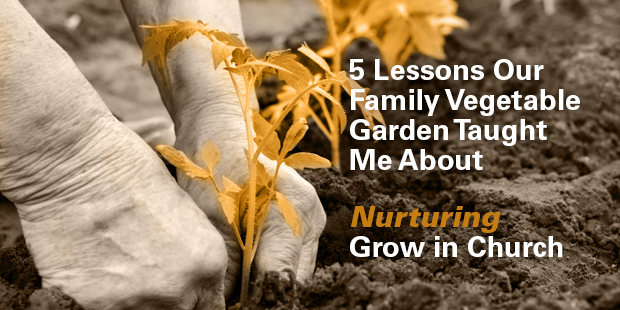
5 Lessons Our Family Vegetable Garden Taught Me About Nurturing Growth in Church
Our family project for the summer revolved around the first-ever backyard garden. Neither my wife nor I profess to have a green thumb, in fact we can kill aloe plants in our family… and those things grow in the desert. With the help of our neighbors, who’s backyard garden should really just be called their “backyarden,” we struck out on a new endeavor. Aside from the obvious and direct lessons in nurturing and patience, many of the experiences our family had in growing a healthy, vegetable-raising backyard garden also resonate with growing a healthy, disciple-raising local church congregation. Here are five things that our family vegetable garden taught me about nurturing growth in churches:
1. Create and Cultivate the Plot. Although in the last few weeks of cucumber domination, our garden left it’s carefully constructed confines, the effort and energy spent in defining, even creating the boundaries directly impacted successful harvesting. Effort was made to construct sides, elevate the planting base and truck in soil containing nutrients and growth agents. Hard work went into culling weeds and grass and tilling the existing clay for deep root growth beyond what was imported. This base became a successful source of healthy growth and created a far greater yield than the same about of area in our yard otherwise would have.
In the same way, churches with effective boundaries, centered on who God has uniquely called them to become, have a better chance at healthy growth and ripe disciples. It is hard work, and not exactly measurable at first, to define boundaries and enrich the existing culture in most churches. Every organization naturally drifts toward complexity, and without deep intervention and removal of roots of past experience, managing the organization can overshadow making the disciples. A strong, defined foundation doesn’t ensure health, but health is much harder to achieve without it.
2. Don’t Avoid the Manure. The “nutrients” and “growth” agents from #1 above were manure. Stinky, smelly messy poop, that when treated in the right environment, produces big, fat vegetables. As I compared notes with other rookie gardeners who did not have as productive a yield, it became clear that our efforts to wallow in the manure, shoveling it, so to speak, were not unrewarded. Crap is critical to growth.
Crap isn’t any less stinky or more fun to handle in the church than it is in the garden. But growth can occur when we deal with it, instead of following initial survival instincts of avoidance or minimalization. It happens, and given the right conditions, only in God’s brilliant design, could conflict, pain and error ever produce growth.
3. Over Planting Affects Everything. Looking back, the biggest rookie mistake we made was to over-plant. We had the right intentions, and at the local garden center, our excitement of what could-be overruled the realities of what our plot could sustain. The summer had hardly begun before tomato plants began outgrowing their wire-basket boundaries and competing for resources. In fact, trying to reverse-engineer structures to support widely fantastic, yet counter productive tomato plant growth, took the majority of our gardening time and energy. And that was before our “3 seed” cucumber experiment started working and consuming every square inch of available space. Evidently cucumbers are a vine. Our green bell peppers didn’t stand a chance, and as it turns out we like green bell peppers more than cucumbers or tomatoes.
In my work as a strategic outsider for churches and ministry organizations, we like to say that “success assaults clarity.” Great programatic intentions left unchecked do not take long to compete for finite financial resources and limited square footage. The excitment of what could be quickly becomes excruciating as we try to sustain growth and success. It doesn’t take long for ministry growth in one area, or every area, to be counter-productive to overall organizational health.A clear and aligned strategy for disciple development minimizes the ongoing headaches usually found within the the instinctive “just start something” approach to ministry. Just because you could start a new ministry or launch another program, rarely means you should.
4. Benefits of Growth Reach Far. Hands-down, our favorite part of this year’s garden was the opportunity to share with our friends and family. At one point we ate dinner with our neighbors and everything but the meat contained something from the backyard, which our dog appreciated. We also ate more fresh food and even pickled some of the banana and jalapeño peppers, storing up extras for fresh summer salsa in late winter days. A few months of intentional effort impacted every other part of the year in ways that we didn’t know possible.
It goes without saying that God can do more with our obedience and intentional focus on the Gospel than we could ever ask for or imagine. Growth in the church is more than attendance or budget, and the influence of disciples making disciples extends beyond the walls to impact families and communities beyond our programatic intentions.
5. Growth is All God. With our best efforts, all we can really ever do is cultivate local conditions, as growth in a garden, or a church, is all God. From the very design of plants or people, God has set forth His plan for growth and development. Our highest level of participation really comes down to obedience to His Word and heeding the direction of the Holy Spirit.We can water, but He provides the rain and sunlight. We can turn the soil, but He grows the roots. We can build the plot, but He grows the plant. We can start the class, but He brings the insight. We can teach the passage, but He implants the application.
We are looking forward to next summer’s garden, and even plan to add an additional plot, just for the cucumbers.

Tags: Bryan Rose, Church Growth, Nurturing growth












